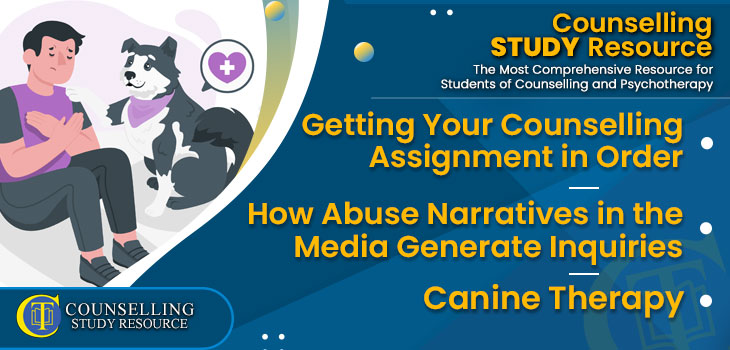285 – Canine Therapy
Getting Your Counselling Assignment in Order – How Abuse Narratives in the Media Generate Inquiries
NOTE: The Counselling Tutor Podcast is a free resource, which is available on the main Counselling Tutor website. We also place it in CSR for your ease of access. Unlike our other CSR resources, podcast episodes may include presenters’ opinions, and are not intended to be referenced for academic use.
In Episode 285 of the Counselling Tutor Podcast, your hosts Rory Lees-Oakes and Ken Kelly take us through this week’s three topics:
- Firstly in ‘Student Services’, Rory and Ken share their advice for getting your assignments in order.
- Then in ‘Ethical, Sustainable Practice’, we look at the ripple effect – how the abuse narratives in the media can generate specific inquiries.
- And lastly in ‘Practice Matters’, Rory speaks with Hilary McNair about canine therapy and her work with her own dog, Oscar.
Getting Your Counselling Assignment in Order [starts at 02:41 mins]
Counselling Foundations is sponsored by
Counselling Skills Academy
Learn counselling techniques by seeing counselling skills used in real sessions by qualified therapists.
Real sessions - real-life presentations - real skills.
Assignments are an essential part of your journey towards becoming a qualified counsellor and in this section, Rory and Ken offer some of their tips and tricks to help you complete them:
- Build yourself a support system for when you're completing assignments over a break – find a way to talk with your peers.
- Think carefully about what the assignment is asking you.
- What information does the question want? Look at Bloom’s taxonomy and highlight the key parts of the question.
- Have a goal in mind and plan how you will achieve it.
- Give yourself structure and schedule.
- Look at the reading list and pick out what is relevant to the question.
- Make notes and build ideas, form the scaffolding for your answer.
- You’re looking to include trigger vocabulary and prove your knowledge.
- Make sure all of your sentences are working to answer the question.
- Read your work aloud, have your peers look over it.
- Show that you understand what you’ve been taught.
- Keep going back to the question – check that you’re addressing/answering it.
A handout on Counselling Assignment Tips is available for download in the green button above.
The Ripple Effect: How Abuse Narratives in the Media Generate Inquiries [starts at 30:41 mins]
In this section, Rory and Ken talk us through the ripple effect, and how it can impact your practice:
- Sometimes news reports may touch on a certain subject, and trigger a response.
- This could lead to more clients looking for specific help with a specific issue.
- By keeping your eye on the media, and the stories that are covered, you can target your CPD to be even better prepared for these clients when they come.
- News coverage or seeing people who have lived through similar experiences come forward, can cause old feelings to come to the surface for clients who have experienced trauma, and urge them to seek help.
- This extra preparation and knowledge can help you to better engage with the clients when they come.
Canine Therapy [starts at 47:57 mins]
The National Counselling Society is proud to sponsor Practice Matters.
NCS are really excited to have launched their Children and Young People Therapist Register for counsellors working with the younger age group.
In this week’s ‘Practice Matters’, Rory speaks with Hilary McNair, accompanied by her dog Oscar, about how they work with clients.
The key points from this discussion on canine therapy includes:
- There is an unconditional positive regard that a dog can bring to the therapy room.
- They are good for emotional regulation.
- They can mirror the things you want to find in a therapeutic relationship – feeling safe, loved, cared for, etc.
- They offer a constant, physical connection that can help the client’s barriers to come down.
- They are very much in the here and now, and can encourage the client to be too.
- They can help a client to regulate by providing them with a safe space.
- There are lots of considerations to having a dog in the therapy room – think about the dog’s temperament and behaviour, the dog’s and the client’s boundaries.
- During canine therapy, be in tune with how the client interacts with the dog.
- See the dog as a relevant part of the counselling process.
- Give the client an understanding of why the dog is in the therapy room – or maybe why they aren’t, e.g. if the dog isn’t feeling up to it today, by letting the client know that the dog sometimes needs rest, the client can recognise that occasional need for rest within themselves.
- Inform your insurance that you will be working with a dog.


